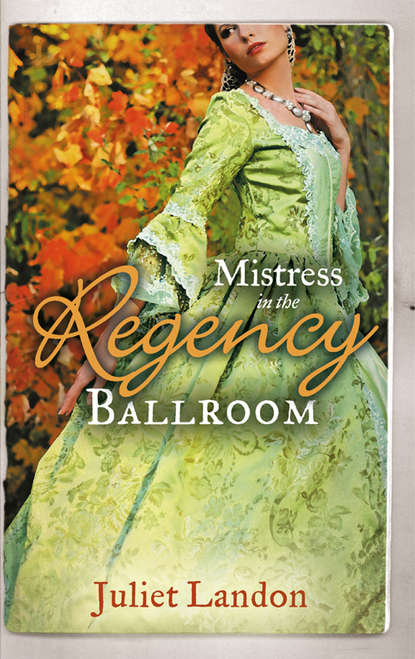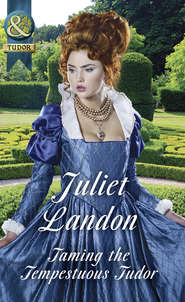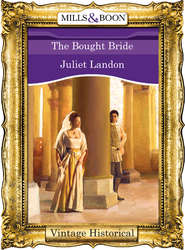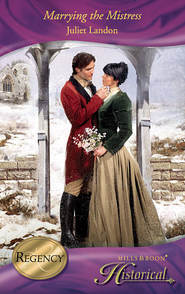По всем вопросам обращайтесь на: info@litportal.ru
(©) 2003-2025.
✖
Mistress in the Regency Ballroom: The Rake's Unconventional Mistress / Marrying the Mistress
Настройки чтения
Размер шрифта
Высота строк
Поля
‘No, you’re not!’ said Lord Elyot, sternly. ‘You’ve had a nasty fall.’
‘Not as bad as I’ve had on the hunting field, my lord.’
‘That was years ago. Rayne and I will support you. See,’ he said, offering her his arm, ‘this is entirely proper. It will cause not the slightest comment for you to take both our arms, Miss Boyce. Will it?’
Obediently linking her arms through theirs, she winced visibly as the dull pain came pulsing into her knee and elbow. ‘Thank you, my lord. You are very kind.’ From the corner of her eye, she caught a look from Lord Elyot sent across her head to his brother.
‘A little kindness goes a long way, eh, brother?’he said, softly.
Bustling towards them, Miss Gaddestone was all concern. Mr Waverley was not far behind, then came the others, flocking to her with smiles of sympathy and tender enquiries. Her arms were relinquished to others on a wave of affection that bore her out towards a waiting carriage, lifting her into it, settling her with rugs and cushions.
‘Bart, will you…?’ she began.
‘Leave it all to me,’he said. ‘Came a cropper, did you, Lettie?’
‘In a manner of speaking,’ she replied, catching Lord Rayne’s eye.
Chapter Five
With so much to be said about the success of the evening, it was very late when the three boarders and Mrs Quayle left Number 24 for their beds next door. Everyone they had spoken to agreed that Miss Boyce’s very select seminary excelled in the quality of the teaching and in the astonishing progress of the pupils. The only sad note was the absence of Edina’s parents and grandparents, though Letitia did her best to sweeten the disappointment by drawing attention to the absence of her own family, too. It could not be helped, she said, if one’s family could not always be where one wanted them to be.
Later, sitting up against a bank of pillows in her own bed, Letitia felt the sadness as keenly as her Scottish pupil, knowing that her sisters would gladly have come if their mother had chaperoned them. What would it take to get her here? she wondered. What would it take to win her approval?
Other incidents had left a sour taste in Letitia’s mouth, the last one being by far the most serious and the one her friends had kindly glossed over as being no more than an accident, though they must have realised there was something more to it than that. She had been warned, and had assured Lord Rayne that she was capable of looking after herself, and now he would think she had brought it upon her own head.
It had also served her right for trying to manage without wearing her spectacles on such an important occasion, and now they were broken. Amongst her literary friends it mattered less, for most of them wore them openly. But tonight she had wanted to look her best, to be a credit to her pupils and to set an example of womanly perfection, as far as she was able.
But her efforts to hold herself above the reach of rakes had been less than successful, for the one whose attentions set up her hackles more than any other had discussed her with his brother as if she were a filly ready to be taken in hand. It was what he had rudely told her more than once. Perhaps that was the way they discussed her sisters also—her ‘tedious, predictable sisters’. Unlike them, she had always been too threateningly bookish for any man to think of in romantic terms, and even Rayne found her—apparently—intriguing rather than attractive, a challenge, a diversion, nothing too serious. Nor had Bart ever shown her any romantic intentions.
Between bouts of reflection, her pencil on the page described the atmosphere, mannerisms, expressions and ensembles, the music and voices, the colours, the blurred flutter of fans and feathers, the perfumes and the faint, warm, male scent of the man who had lifted her from the floor, effortlessly. The pencil stopped, her head fell back upon the pillow, eyes closed, remembering. Was that how it would feel to be lifted, carried, laid upon a bed?
Busily, the pencil continued its word pictures. Her elbow and knee throbbed. She took another sip of warm chocolate while constructing an image of Lady Boston who would, naturally, be ravishingly beautiful, not at all sharp-tongued or intellectual, and probably pining up in Northumberland for the brother of her uncle-in-law. Was he within the permitted degree of consanguinity? Did it matter these days? She fell asleep, wondering about it, convinced that Lord Rayne did not intend anything more than a light flirtation, being still half in love with Lady Elyot’s beautiful talented niece. Yes, she was sure to be talented and experienced. A society high-flyer she would be.
Several times she woke when her knee and elbow pressed upon something, sending her thoughts rushing back into the angry pocket of her mind where Sir Francis’s unfortunate lack of manners hovered like a giant question mark over the messages she was unconsciously sending out about her accessibility. Was her learning attracting the wrong kind of man? Was it perhaps to do with her care of younger women? For Lord Rayne to overstep the mark was one thing, but for the father of one of her own pupils to forget the respect due to her was nothing short of shameful. By dawn, she felt as if she had hardly slept at all.
Monday morning, usually kept for music, was taken at a leisurely pace over jugs of barley water and coffee, cook’s best biscuits and a continuous flow of laughter and discussion about future events. Sitting outside in the garden, Letitia used the opportunity to show them the new shoots of herbs, dill, parsley, rosemary and thyme, and to make a game of recognising them by smell alone. Then there were formal thank-you letters to be written to their hosts, leaving Letitia to put her feet up in the roomy summerhouse where the footman came to find her with the news that she had two morning callers.
‘Lady Elwick and Lady Elyot,’ he called to her.
She swung her legs down, but her guests would not allow her to stand for longer than it took to exchange kisses to both cheeks.
‘We came to see how you are this morning…’
‘…taking a ride through the park…’
‘…and to thank you and the girls…’
‘…for the concert. We must do it next at Sheen Court.’
Letitia was used to the twins’ interwoven sentences, but she had not encountered these two sisters-in-law together until now. Lady Elyot was a dark classic beauty; Lady Adorna Elwick was fair and quite unlike her two brothers. However, she shared with them their noble parentage, so was entitled to be known as Lady Adorna from birth, whereas the title of Lady Elwick came via her late husband. To confuse matters more, she had been known from childhood as Dorna, and the name still held.
Lady Dorna laughed readily, caring nothing for the crinkles around her merry blue eyes, the same shade exactly as the flimsy morning gown and low-cut velvet spencer. Ribbons flowed from her ruched poke-bonnet, and a lacy parasol was furled into a spear as she took the chair next to Letitia. ‘Isn’t this cosy?’ she laughed, looking about her at the cushioned benches, basket chairs and rattan tables. ‘One could have a secret rendezvous in a place like this, Amelie. Couldn’t one? Oh, what fun! I think mine is too small for anything as romantic as that. Perhaps I ought to enlarge it.’
Lady Elyot shook her head, smiling at her sister-in-law’s artlessness. ‘Dorna, you are shocking Miss Boyce, dear. This darling place is used only for taking tea and writing one’s journal, isn’t it, Miss Boyce? Tell Dorna I’m correct. Mind you, if I had it, I’d use it to do my painting in.’
‘That is what I use it for, my lady. Writing and painting.’
‘Of course you do. As soon as we met I could see you were artistic. Writing and art: two sides of the same voice. You keep a journal, do you? Most women seem to, nowadays.’
‘It’s one of the subjects we teach. That, and the art of letter-writing. Speech-writing, too. There are sure to be occasions when they’ll be expected to say something intelligent in public.’
‘You are so progressive in your thinking, Miss Boyce.’ Sliding gracefully into the other basket chair, Lady Elyot lifted a ladybird off the arm and placed it gently on to the vase of tulips. ‘There will also be times when they’ll be expected to attend a local Vestry meeting. Our new Vestry Hall is only a few doors away from here. Why not bring them along one day, just to listen?’
‘Thank you. That would certainly open their eyes. We shall all be going to the theatre this evening. The girls are studying The Merchant of Venice and, by chance, that’s the play being performed.’
‘A coincidence indeed!’said Lady Dorna, delightedly. ‘We have arranged to go, too. We’re to have dinner first at the Castle, then straight to the Theatre Royale. Now why don’t you join us for dinner, Miss Boyce? You and your boarders. And your two chaperons?’
‘Lady Dorna, it is more than kind of you to invite us, but we couldn’t possibly all come. That would be far too many because our party includes Mr Waverley and Mr Thomas, the elocution teacher. He wants to come, too. Why do you not come to us instead? It would be much more convenient, I think. We shall be dining early at six o’clock in time for the performance at eight. Just a simple repast. We’d be honoured if you would share it with us.’
Lady Elyot was concerned about the short notice to Letitia’s cook, but Lady Dorna had no hesitation in accepting. ‘Why not?’ she said. ‘Seton hopes to be with us, too. What a party we shall be.’
‘Is not Lord Rayne at Hampton Court today?’ said Letitia.
‘Yes, but he’s returning in time for our theatre dinner.’
‘That’s not like him,’ said Lady Elyot. ‘Seton has never been too keen on Shakespeare.’
‘Well, dear, that’s what I put to him, but he tells me he’s reforming.’
And perhaps, Letitia thought, Lord Rayne has received another invitation from Miss Sapphire Melborough who, like the other day pupils, would be attending with their parents. With this certainty in her mind, she found it hard to accept that she was being used by the scheming young woman as a way of including Lord Rayne in her social life, whether she approved or not. If that were the case, there was little she could do about it, but she would have preferred the Melboroughs rather than herself to have the pleasure of feeding him.
To her relief, Mrs Mappleton, the cook, seemed quite unperturbed by an extra five guests to cater for. Mrs Brewster, the housekeeper, after indulging in the obligatory astonishment, soon began to warm to the idea of entertaining an extra two lords, two ladies and a captain. It was still before noon, enough time to send for more meat and fish, to prepare more side-dishes and desserts, and enough time for Letitia’s pupils to decorate an enlarged dinner table. It was good experience, she told them, opening the double doors between dining and drawing rooms, thinking how right she had been to buy the extending table and matching chairs from Gillow of Lancaster. Lady Boyce had insisted it would be too large for Letitia’s purposes. Rather than set thirteen places, however, she sent an invitation to Mr Titus Chatterton, who lived near Mr Waverley on The Green, asking him to dine with them. He was an entertaining guest, for all his face paint and flamboyance, and one could not help but like him.
For the remainder of the day, she showed her pupils how a good hostess must prepare for last-minute diners without the slightest sign of improvisation or muddling through, and without upsetting one’s cook or housekeeper.
By the time the first carriages rolled up at the door, the day pupils had returned home and the duty of receiving the guests was shared by the boarders as part of their education.
Acting as assistant host, Mr Waverley took the head of the table with Lady Dorna to his right while Letitia and Lord Elyot took the opposite end, and although there were more ladies than gentlemen, the arrangement could not have been more comfortable for the three youngest ladies for whom this was a kind of lesson. The guests appeared to understand it well, this being the first visit for four of them, and even though good manners forbade any show of amazement at Letitia’s exquisitely tasteful surroundings, it was impossible for them not to appreciate the ivory-handled cutlery and fine engraved glassware, the blue-and-white Wedgwood dinner service matching the posies of bluebells and white lilac filling every space between silver dishes.
It was too early in the year for fresh green vegetables, but root varieties had been made into a pie, with a fricassee of turnips, and roasted potatoes, still a talking point. Nor was there any shortage of lamb, gammon or game, salmon and sole, pies and rissoles, sauces and garnishes and, as the guests were so appreciative and unpretentious, the meal flowed easily along with good wines and home-made orange wine for the younger ones. Tarts and cheesecakes, blancmanges, fruit jellies and creams were toyed with as the talk, inevitably, veered towards the contrast between the pupils’ study of Shakespeare and their greater penchant for the novels such as The Infidel and, more recently, Waynethorpe Manor. The general opinion seemed to be that they could not have been written by a woman, in spite of what the title page told them.
Letitia had no opinion to offer on that, but laughed as she offered her poor excuse. ‘Variety? My pupils are encouraged to discuss whatever they read, whether it’s classical or popular fiction. If it’s well written, it’s readable.’
Captain Ben Rankin, Lady Dorna’s good-looking friend, was intrigued by this view. ‘So you’ve read them, too?’he said.
‘Indeed I have, Captain. I would not otherwise allow my young ladies to.’
‘And you approve, I see. Does Mr Thomas approve, too?’











